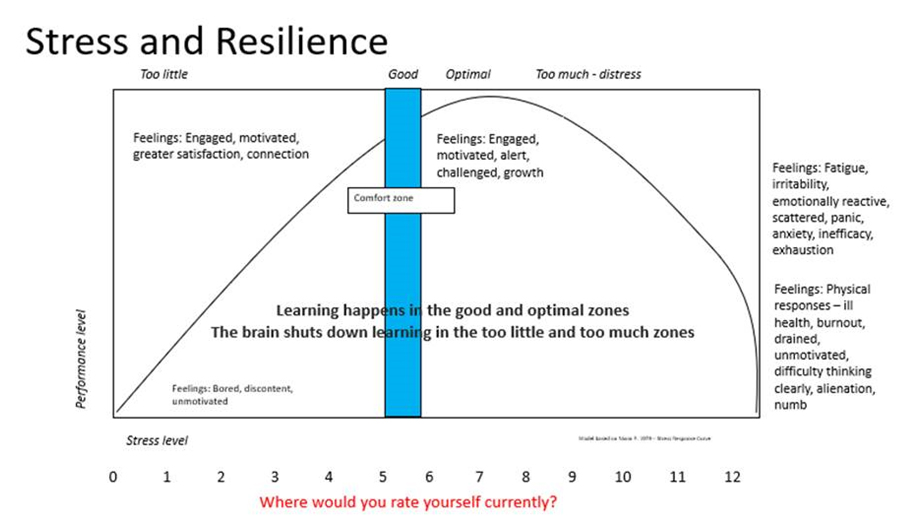Resilience keeps us going through stressful times and enables us to bounce back from adversity. As we head into the end-of-year examinations, let us deconstruct the relationship between resilience and stress. Can stress be good? Does it enable us to cram just before a test? How much stress can your body take? What does resilience have to do with it?
Not all stress is bad. We need some stress to be at our best. Absence of it can make us bored, and even dissatisfied with life. With no stress, we may also feel unmotivated to do anything at all leading to no or low performance. Too much, and our health and performance deteriorate.

The diagram [i] shows a stress continuum along the horizontal axis from 0 to 12. The performance level is shown on the vertical axis. Note how too little, just enough and too much stress affects us. As we add stressors, we start to wake up to handle those things and engage with life [ii]. With an increase in stress, we engage more and become more satisfied, but only up to a point. Notice our ‘optimal’ point—the potential we always hear about is just beyond our comfort zone. But beyond that is the tipping point where we become overwhelmed and deteriorate.
In the short term, stress releases hormones that boost focus, memory and creativity. A century ago, Harvard researchers, Robert M Yerkes and John D Dodson, calibrated the relationship between stress arousal and performance, finding that as stress increases, so do efficiency and performance [iii]. However, they noted that once stress exceeds a certain level, its benefits disappear and performance declines. Mental flexibility, concentration and mood all take a hit once we move beyond the tipping point.
This optimal point is where the relationship begins between stress and resilience. Resilience is being able to power through stress. It is important to note that responses differ from one person to another as our stress levels are uniquely our own, although a person’s response tends to be consistent over time. People who understand their bodies know how much stress to take on and where the optimal point is after which they need to step back.
A resilient person is not one who does not feel stress but one who knows how to manage it and when to step off the pedal.
Resilience is, therefore, a character trait that people demonstrate in the face of stress. An example would be that highly resilient people exercise even when extremely busy because it helps them manage stress.
Where is your boundary between good stress and bad stress? And how do you know when you are close to crossing that line to ensure you stay resilient and not cross it?
References
- [i] https://openi.nlm.nih.gov/detailedresult?img=PMC4383502_APM2015-749417.001&req=4
Model based on Nixon P. 1979 – Stress Response Curve - [ii] https://www.youthcoachinginstitute.com/product/resilience-coaching-program-curriculum-general-edition/ Resilience Coaching YCI, USA
- [iii] https://www.healthline.com/health/yerkes-dodson-law

